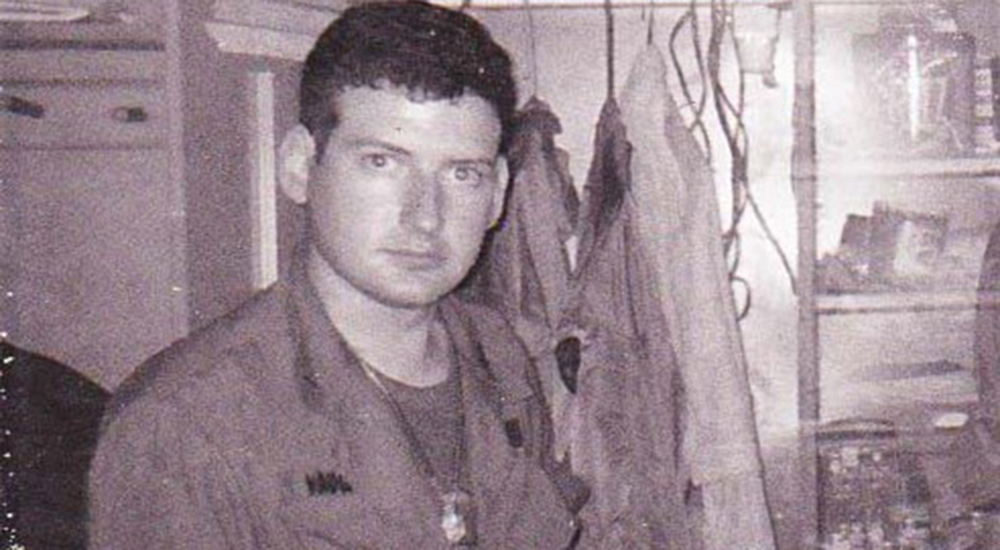William Vaughn didn’t know his Huey helicopter was sharing airspace over Vietnam in 1969 when a plane overshadowed him and his crew and sprayed them with a powerful herbicide that packed a lifelong punch.
“We had a military aircraft fly no more than 50 feet over our helicopter. It covered us with Agent Orange,” recalled Vaughn. Vaughn, pictured above, is an Army Veteran who enlisted in 1968 and spent about eight months flying in Southeast Asia. “It covered the entire aircraft and our crew.”
From 1962 to 1971, the U.S. military sprayed more than 19 million gallons of tactical herbicides to remove the dense tropical foliage that provided enemy cover in Vietnam. VA has linked numerous diseases to Agent Orange exposure.
“We were heavily dosed with those types of herbicides throughout the war,” Vaughn said. “Combine these exposures with a couple crash landings, and my health was never the same.”
PTSD, back pain, peripheral neuropathy

From 1962 to 1971, the U.S. military sprayed more than 19 million gallons of tactical herbicides to remove the dense tropical foliage that provided enemy cover in Vietnam. VA has linked numerous diseases to Agent Orange exposure.
Today, Vaughn is 90% service disabled and diagnosed with PTSD and chronic back pain. He also has peripheral neuropathy. The treatment causes numbness, sharp pains and muscle weakness in his extremities. It also causes aphasia, which impedes his ability to speak clearly.
“When I first began receiving treatment at VA, I was prescribed painkillers. Eventually, I began attending in-person chronic pain classes and appointments,” said Vaughn. “These classes were helpful, but the process of attending in-person classes and appointments was often as stressful as finding a safe landing zone in Vietnam.
“Battling Seattle traffic on the way to the VA Medical Center was always a challenge. It amplified the pain, since many of my symptoms are brought on by stress.”
That’s when Vaughn was referred to Dr. Erika Shearer. Shearer is a TeleMental Health psychologist within the VA Puget Sound Health Care System. She offers virtual visits through VA Video Connect. The app enables Veterans and their caregivers to meet with VA care providers through live video on any computer, tablet, or mobile device with an internet connection.
Vaughn and Shearer now meet online once every two weeks.
“Brings me back into focus.”
“Dr. Shearer is able to help me from her office in Portland in a comfortable, private setting. And I’m able to receive the help I need in a comfortable setting without the stress of traffic and hospital waiting rooms. She brings me back into focus and helps me deal with a very dark time.”
Vaughn also credits virtual visits and VA telehealth technologies with helping him stay healthy while following COVID-19 social distancing guidelines and stay-at-home orders. Vaughn is an early adopter of My HealtheVet. The online platform lets Veterans send secure messages to their VA care teams, refill VA prescriptions and download their electronic health records. Together, My HealtheVet and VA Video Connect allow him to receive care without risking exposure to the coronavirus.
The number of telehealth video appointments held in one week through VA Video Connect has increased by more than 1000% since February 2020. Data shows that VA providers conducted approximately 10,000 appointments a week in early February compared with more than 120,000 appointments a week in May.
Veterans interested in starting VA telehealth services should talk with their VA care teams.
Visit the VA Video Connect webpage to learn more about using the app to enhance your care.
Topics in this story
More Stories
Watch the Under Secretary for Health and a panel of experts discuss VA Health Connect tele-emergency care.
The 2024 National Veteran Suicide Prevention Annual Report provides the foundation for VA’s suicide prevention programs and initiatives.
Theranostics is a specialized field of nuclear medicine that uses a two-pronged approach to diagnose and treat cancer.







My first claim was denied, I will soon turn 75 and go to the front of the list. Fighting leukemia for many years. Delay, deny until I die. In Guan 66 and 67, Kadina 67. I will continue to fight the VA.
My Tallahassee fl VAMC care team hasn’t bothered to help me with telehealth. My MD is only good at telling me what she CANNOT do. I have chronic pain but no treatment. I was diagnosed with peripheral neuropathy and myopathy but ZERO follow up. I have very bad insomnia but had to virtually beg to get a sleep aid medicine. Because of the Tallahassee VAMC and the N.Fl/S. GA health care system I have ZERO trust in the VA and ZERO confidence in my primary MD’s ability to competently address my health care needs.
I have heard that the chemical formula used for Agent Orange is nearly identical to RoundUp. If this is true how may we get included in the RoundUp settlement?